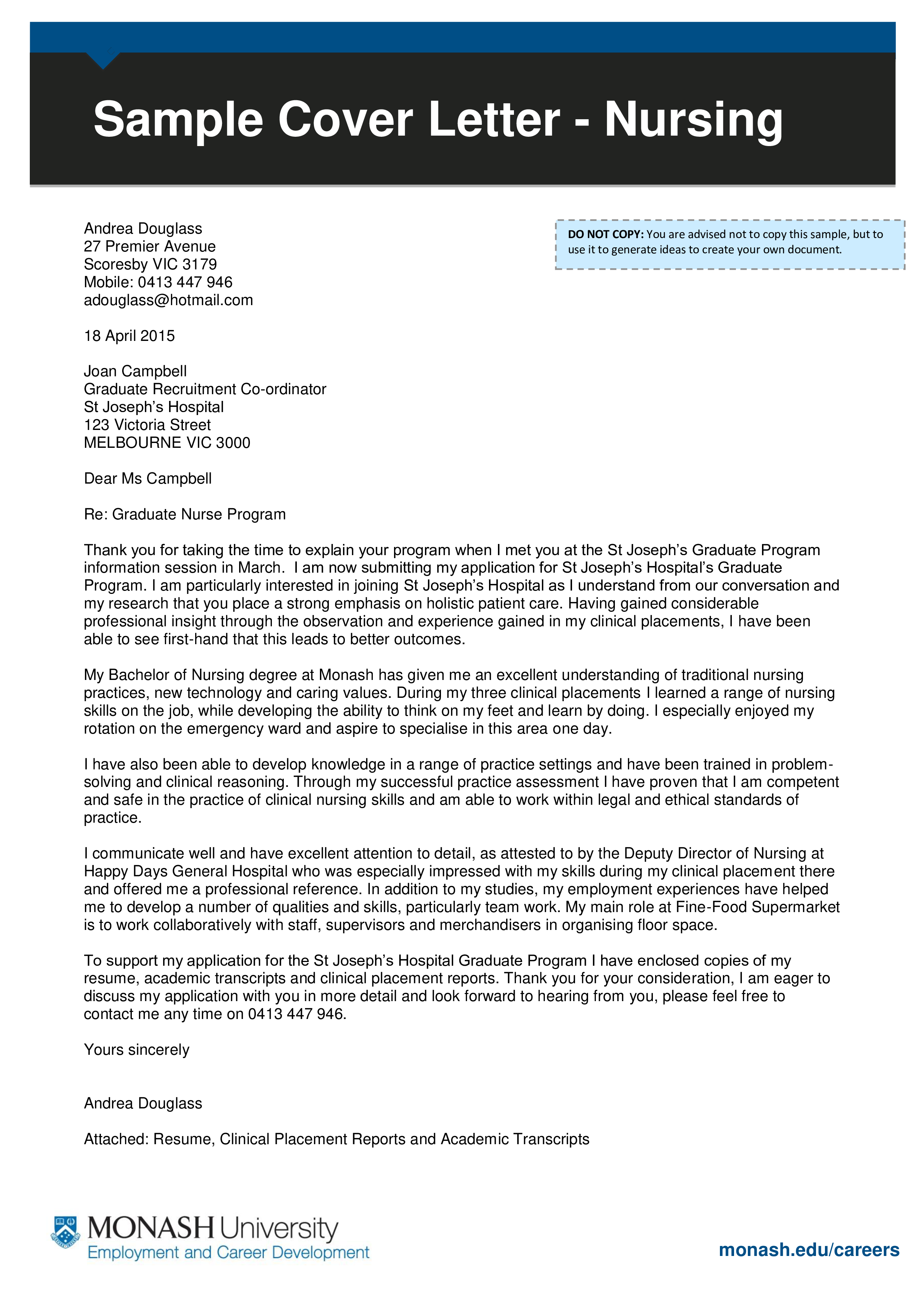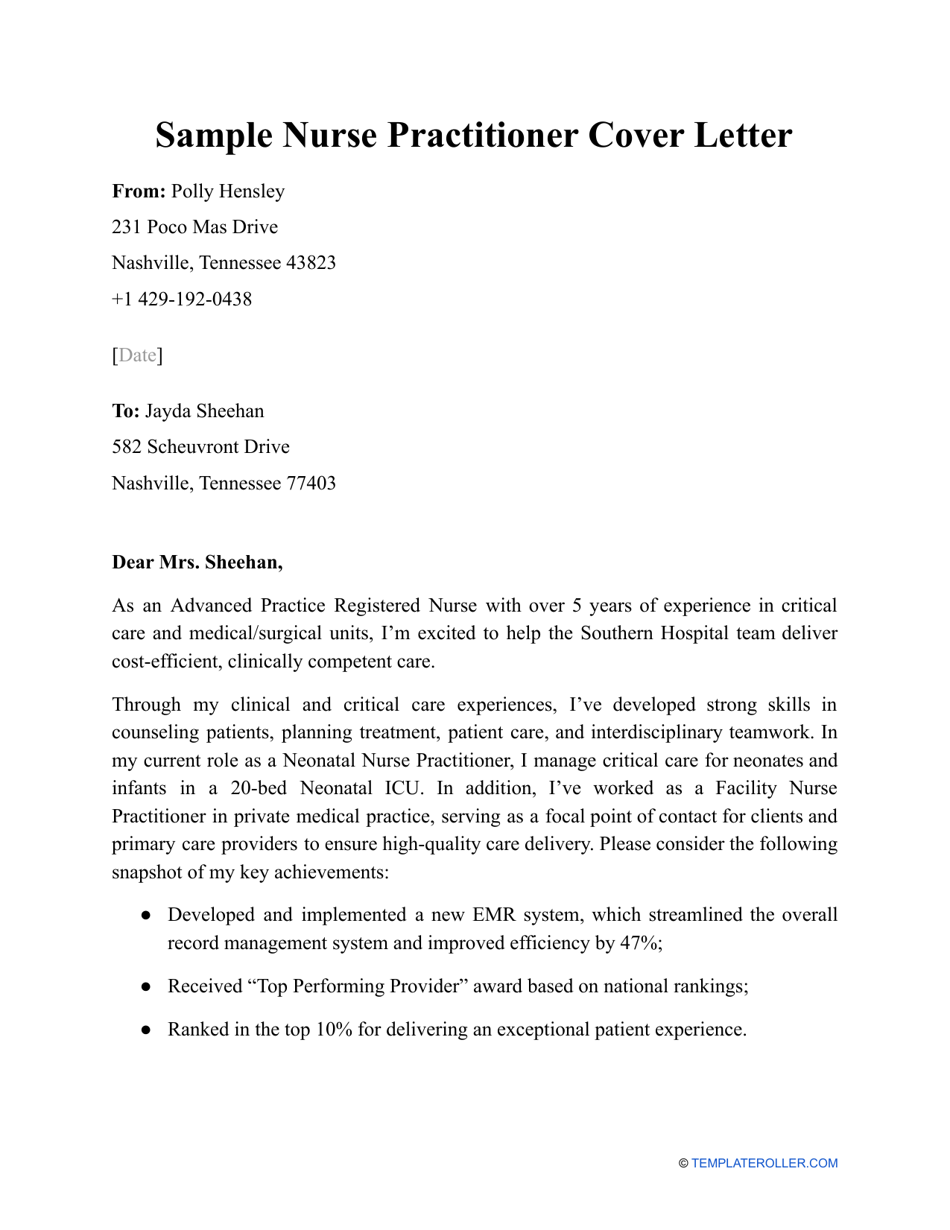Imagine yourself walking into a bustling hospital, the familiar scent of disinfectant in the air, the rhythmic beeping of machines, and the constant flow of patients, their hopes and anxieties hanging heavy. You’re ready to face it all, to bring your skills and compassion to a profession that demands immense dedication and a caring heart. But before you can step foot into this world of healing and support, you must first navigate the crucial hurdle of securing a nursing position. Your application letter is your first impression, a chance to showcase your qualifications and passion for patient care.

Image: www.allbusinesstemplates.com
This guide aims to empower you with the knowledge and resources to create a compelling application letter that truly reflects your dedication to nursing and sets you apart from the competition. We’ll delve into the essential elements of crafting a winning letter, and we’ll even provide you with a downloadable PDF template to get you started.
Essential Components of a Stellar Nursing Application Letter
A well-structured application letter is like a carefully curated symphony, each section playing its part to create a harmonious whole.
1. Heading and Contact Information (The Overture)
This section sets the stage for your letter. It’s your opening act, introducing yourself and providing your contact details. Keep it concise and professional:
- Your Name: State your full name clearly.
- Your Address: Include your current street address (optional).
- Your Phone Number: Provide a phone number where you can be easily reached.
- Your Email Address: Use a professional email address (e.g., [email protected]).
- Date: Always include the current date.
- Recipient’s Name and Title: Direct your letter to a specific person, if possible. Do your research to find the hiring manager or department head and use their correct title (e.g., Hiring Manager, Nurse Manager, etc.).
- Recipient’s Address: Include the specific address of the hospital or healthcare facility.
Example:
Jane Doe
123 Main Street, Anytown, CA 12345
(123) 456-7890
[email protected]
February 15, 2024
Mr. John Smith
Hiring Manager
ABC Hospital
456 Elm Street, Anytown, CA 12345
2. Salutation (The First Note)
A warm and respectful salutation sets the tone for your letter.
- Traditional: Use “Dear Mr./Ms./Dr. [Recipient’s Last Name].”
- Formal: If you don’t know the recipient’s name, use “Dear Hiring Manager” or “Dear Hiring Committee.”
- Informal: In rare cases, you may use a less formal salutation if you have a pre-existing relationship with the recipient. However, it’s generally best to maintain a professional tone in your application letter.
Example:
Formal: Dear Mr. Smith,
Informal: Dear John, (If you have a prior relationship with the recipient).

Image: www.hotzxgirl.com
3. Paragraph 1: Introduction and Interest (The Theme)
Grab the reader’s attention right from the start. Briefly state your purpose for writing and express your enthusiastic interest in the specific nursing position you’re applying for. Don’t be afraid to express your passion for nursing!
Example:
-
“Dear Mr. Smith,
I am writing to express my keen interest in the Registered Nurse position advertised on [website/publication] for [department]. I have been a dedicated Registered Nurse for [number] years, with a passion for providing compassionate and effective patient care.”
4. Paragraph 2: Highlight Your Skills and Experiences (The Melody)
This section is your chance to shine! Showcase your relevant qualifications, skills, and experiences. Use specific examples to demonstrate your competence in areas such as:
- Clinical Skills: Mention your expertise in various nursing procedures, patient assessments, medication administration, wound care, etc.
- Communication and Interpersonal Skills: Emphasize your ability to effectively communicate with patients, families, and colleagues. Highlight your experience in patient education, conflict resolution, and teamwork.
- Professional Certifications and Licenses: Include any relevant certifications or licenses, such as RN, BSN, CCRN, etc.
- Specialization or Areas of Interest: If you have a specific area of nursing expertise or interest (e.g., oncology, pediatrics, critical care), mention it here.
- Technical Skills: If the position requires specific technical skills, such as working with electronic health records (EHRs), computer skills, or fluency in other languages, make sure to highlight those skills.
Example:
- “Throughout my career, I have gained extensive experience in [mention specific departments or areas of expertise, e.g., critical care, emergency room, etc.]. I am proficient in [mention specific clinical skills, e.g., administering intravenous medications, performing complex wound care, etc.]. I also excel at effectively communicating with patients and their families, ensuring they feel heard, understood, and supported.”
5. Paragraph 3: Align Your Skills with the Job Description (The Harmony)
Connect the dots! Show how your skills and experience directly align with the requirements outlined in the job posting. Match your qualifications with specific responsibilities mentioned in the job description.
Example:
- “I am particularly drawn to [mention specific aspects of the job description that resonate with you, e.g., providing care to a diverse population, working in a fast-paced environment, etc.]. My proven ability to [mention a specific skill aligned with the job description] makes me confident in my ability to contribute meaningfully to [department name].”
6. Paragraph 4: Enthusiasm and Commitment (The Crescendo)
Demonstrate your passion for the nursing profession and your commitment to the organization. Mention any relevant experience or skills that align with the hospital’s mission, values, or goals.
Example:
- “I am deeply passionate about providing compassionate and evidence-based patient care, and I am particularly drawn to [hospital name]’s commitment to [mention specific values or initiatives mentioned in the hospital’s website or mission statement, e.g., patient-centered care, community outreach, etc.]. I believe my skills and dedication align perfectly with [hospital name]’s mission, and I am confident that I can make a significant contribution to your team.”
7. Closing Paragraph (The Finale)
End your letter on a strong note. Express your appreciation for the opportunity to apply and your eagerness to learn more about the position. Include a call to action, stating your willingness to be contacted for an interview.
Example:
-
“Thank you for your time and consideration. I am eager to learn more about this exciting opportunity and discuss how my skills and experience can benefit [hospital name]. I am available for an interview at your earliest convenience and can be reached at [phone number] or [email address].
Sincerely,
Jane Doe”
Using a PDF Template for Your Application Letter
To help you create a professional and structured application letter, we have included a downloadable PDF template for your convenience. This template provides the basic framework and guidance to help you organize your thoughts and ensure all essential elements are included.
(Downloadable PDF Template)
- [Link to Downloadable PDF Template]
Powerful Tips for Crafting a Memorable Application Letter
- Tailor Your Letter: Every application letter should be tailored to the specific job and organization you’re applying for. Carefully read the job description and highlight your most relevant skills and experiences.
- Proofread Carefully: Typos and grammatical errors can create a negative impression. Double- and triple-check for any mistakes before submitting your letter.
- Keep it Concise: Stick to one page. Be clear and concise in your writing, avoiding unnecessary jargon and lengthy paragraphs.
- Be Professional: Use a formal tone and avoid slang or informal language. The document should reflect your professionalism and respect for the organization.
- Showcase Your Personality: While you should maintain professionalism, don’t be afraid to let your personality shine through. Show your passion for nursing and your desire to make a difference in the lives of patients.
- Highlight Your Achievements: Don’t just state your skills; provide specific examples that demonstrate how your abilities have made a positive impact.
- Follow Up: After sending your application, consider following up with a polite email or phone call to inquire about the status of your application. This shows your continued interest and initiative.
Application Letter For Nursing Job Pdf
Conclusion
The application letter is your first opportunity to make a lasting impression on potential employers. A well-structured and compelling letter can set you apart in a competitive job market. By following the guidance and tips provided in this article, you can create a stellar application letter that truly reflects your qualifications, enthusiasm, and commitment to the nursing profession. Don’t forget to download our PDF template to guide you in the process.
Remember, your passion for nursing and your dedication to providing exceptional patient care will resonate through every line. With careful preparation and a genuine desire to make a difference, you are well on your way to securing a rewarding career in the world of healthcare.






